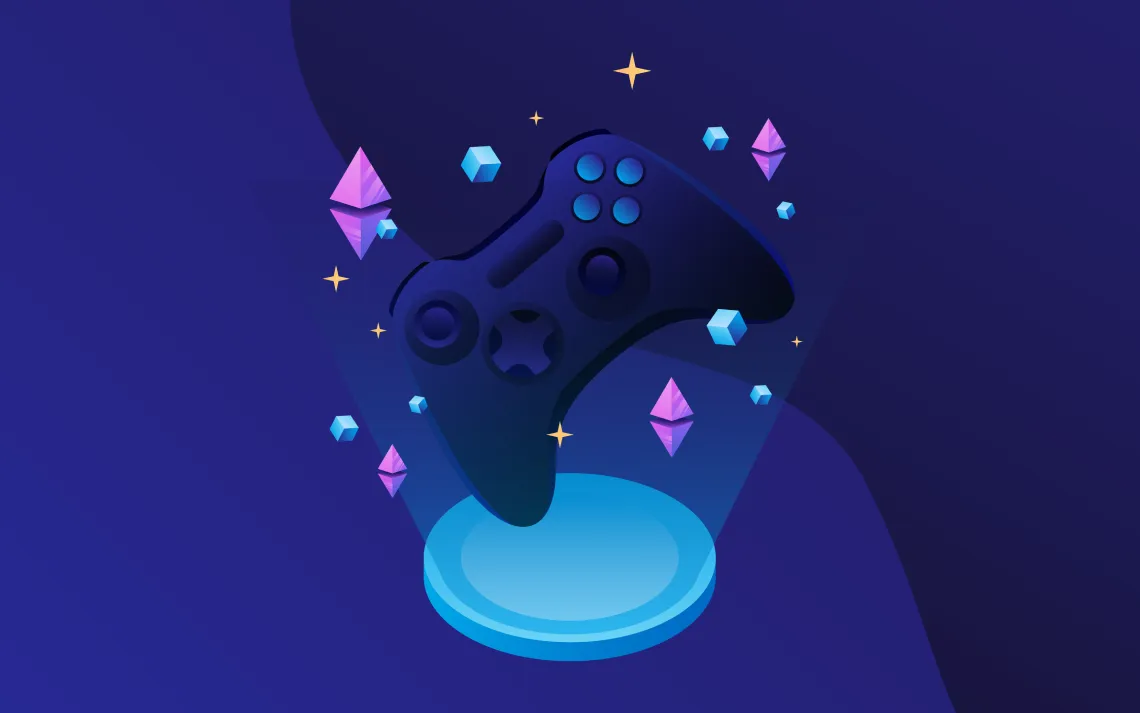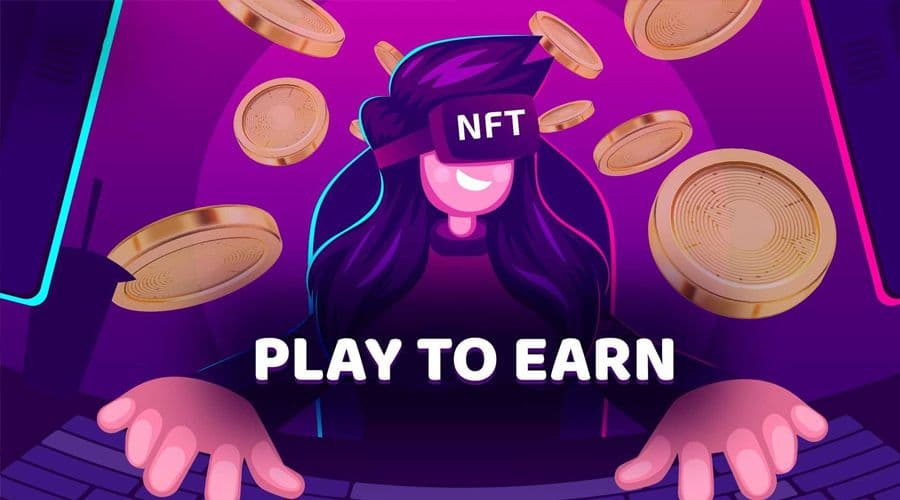In recent years, the intersection of blockchain technology and gaming has sparked intense debate and speculation about the future of the gaming industry. With the emergence of web3, a decentralized internet infrastructure built on blockchain principles, enthusiasts and industry experts alike are questioning whether this paradigm shift could revolutionize the way we play and interact with games.
The world of web3 promises a decentralized, transparent, and immersive gaming experience, offering players ownership of in-game assets, true digital scarcity, and unprecedented levels of security. As blockchain technology continues to evolve and gain traction, the question arises: Is web3 the future of gaming?
In this article, we dive into the potential impact of web3 on gaming ecosystems, the challenges it may face, and the transformative opportunities it presents for gamers, developers, and the industry as a whole.
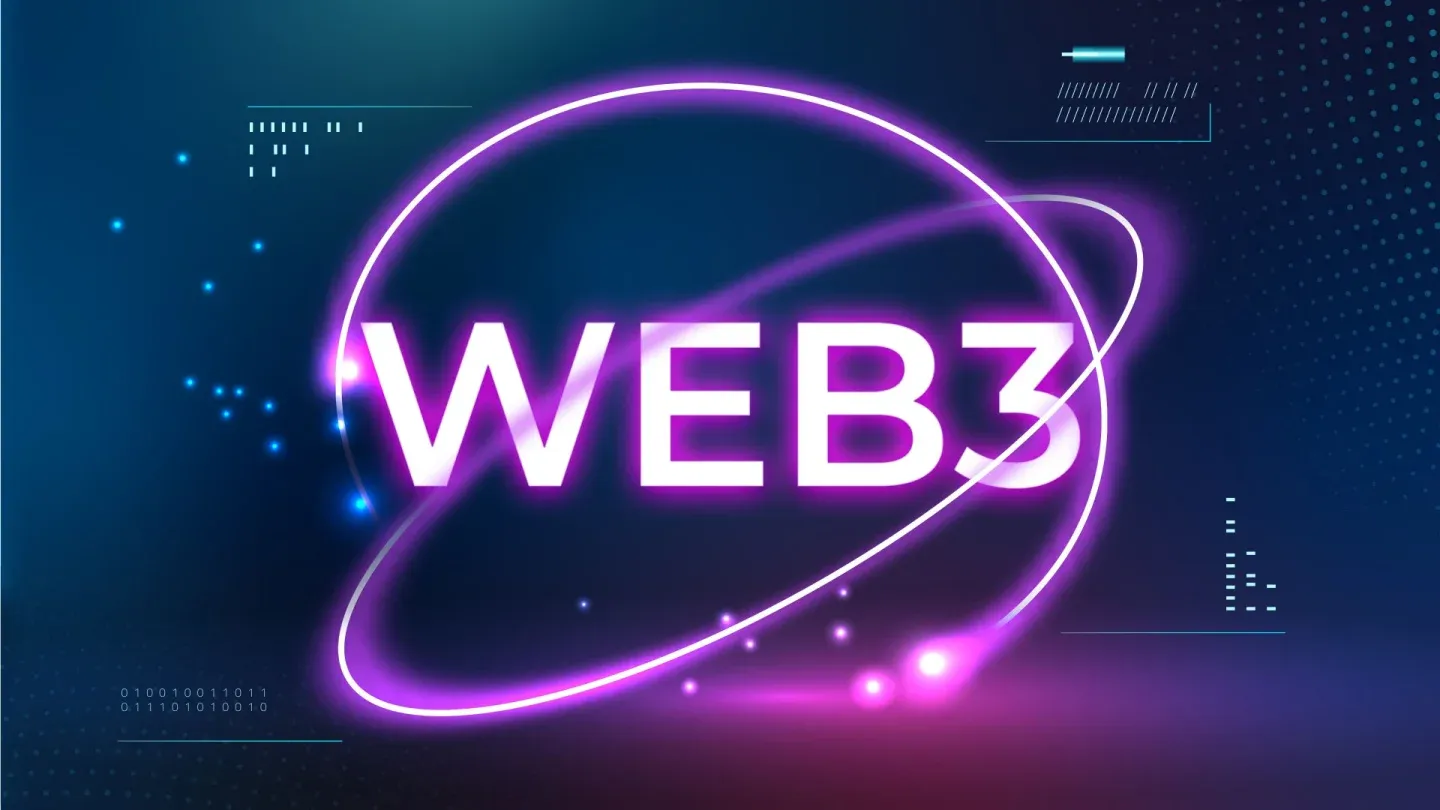
Key Definitions
Play-to-Earn: "Play-to-Earn represents a genre of blockchain-based games that incorporate player-owned economies through the use of in-game assets represented by tokens and NFTs.”
Blockchain Game: "A blockchain game is any game that uses blockchain technology to enhance or rearchitect traditional video games."
NFT Game: "An NFT game is a video game that uses NFTs as a core part of their gameplay and economy. NFTs, or Non-Fungible Tokens, are 1-of-1 tokens generated by smart contracts and blockchain technology"
The landscape of traditional web2 gaming has undergone significant transformations throughout the years. Presently, blockchain technology emerges as a transformative force, reshaping the gaming industry as we know it.
The world of web3 gaming leverages distributed ledgers, non-fungible tokens (NFTs), and decentralization to empower players with unprecedented control over beloved franchises. As of 2022, gaming represents a substantial portion, approximately 49%, of daily blockchain activity, indicating sustained momentum.
What is Web3 Gaming?
(1) Distributed Ledger Technology and NFTs
Web3 games are distinguished by their integration of distributed ledger technology (DLT), a feature that facilitates improved transparency and security. By leveraging DLT, these games can reward players with cryptocurrency assets and democratize the development process. Notably, web3 games frequently tokenize in-game items as non-fungible tokens (NFTs), granting gamers complete ownership of their digital assets within the game environment.
(2) Conventional Gaming Infrastructure and Blockchain
It's crucial to understand that web3 games are not directly stored on the blockchain. Instead, they utilize conventional gaming infrastructure and web2 technology for the gaming environment. Players link their wallets to the game, while developers employ smart contracts to establish a connection between the web2 software and its web3 components, ensuring seamless integration of blockchain features.
(3) Smart Contracts and Wallets
Smart contracts are indispensable in the web3 gaming arena. They facilitate the transfer of digital assets such as gaming NFTs or fungible tokens to players' wallets when earned. Additionally, in scenarios where developers establish a gaming DAO, smart contracts are employed to facilitate and tally votes, ensuring transparent and efficient decision-making processes within the gaming community.
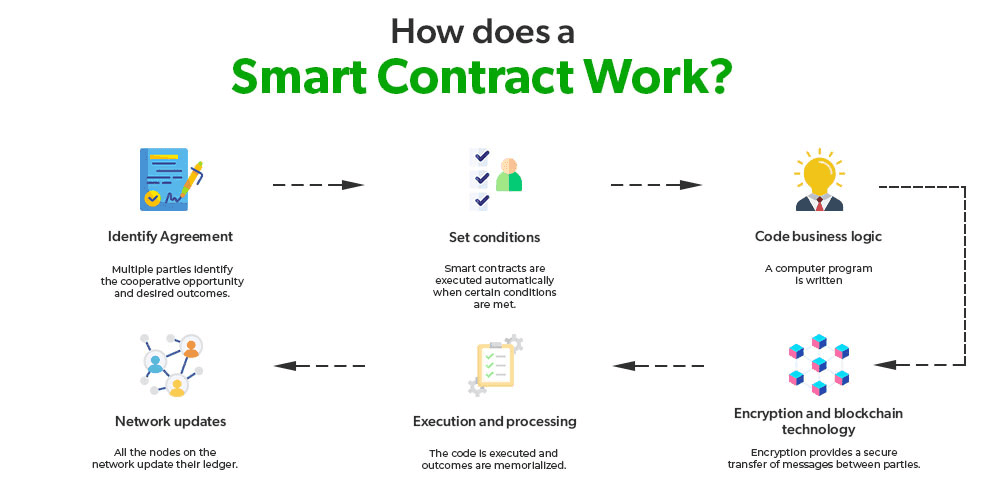
Bring Web2 IP to Web3?
In theory, any web2 game has the potential to "transform" into a web3 game. In fact, notable developers like Ubisoft and Square Enix have begun integrating web3 elements into some of their games, including well-known franchises such as Tom Clancy's Ghost Recon.
Decentralization stands as a cornerstone feature in blockchain-based gaming. Numerous developers harness gaming decentralized applications (dApps) to facilitate in-game transactions and interactions with the blockchain. These dApps operate through a network of interconnected nodes rather than a centralized server, ensuring a decentralized infrastructure for gaming activities.
With decentralized node operators, player asset ownership, and decentralized governance structures, web3 games typically exhibit a more player-driven environment compared to web2 games.

Benefits of Web3 Gaming?
The web3 gaming ecosystem offers a multitude of advantages, including heightened transparency, security, and privacy. In this next section, we will delve deeper into the myriad reasons why web3 gaming is thriving.
(1) Increased Transparency
The web2 gaming industry has faced criticism for its lack of transparency, often characterized by publishers imposing Non-Disclosure Agreements (NDAs) on game developers and withholding in-game footage until a polished demo is created.
While such practices can still occur in the web3 ecosystem, its decentralized nature reduces their likelihood. Many blockchain gaming developers opt to share the progress of their games as they are developed, and some even involve players in decision-making processes.
Moreover, transactions and item minting in web3 gaming are stored in publicly distributed ledgers, providing players with visibility into the quantity of each item that will exist. This transparency enhances player trust and confidence in the gaming experience.
(2) Ownership of In-Game Assets
Web3 projects revolutionize gaming economies by enabling players to buy and sell their in-game items. For instance, Gods Unchained permits players to trade their cards on the secondary market. In contrast, many web2 trading card games like Hearthstone and Magic: The Gathering Arena reward players with cards that cannot be traded with others.
While it's accurate that certain web2 games such as Magic: The Gathering Online facilitate the buying and selling of in-game items, these items are typically stored on centralized servers. Consequently, if the developer decides to shut down the server, the items vanish, highlighting the vulnerability of centralized systems.
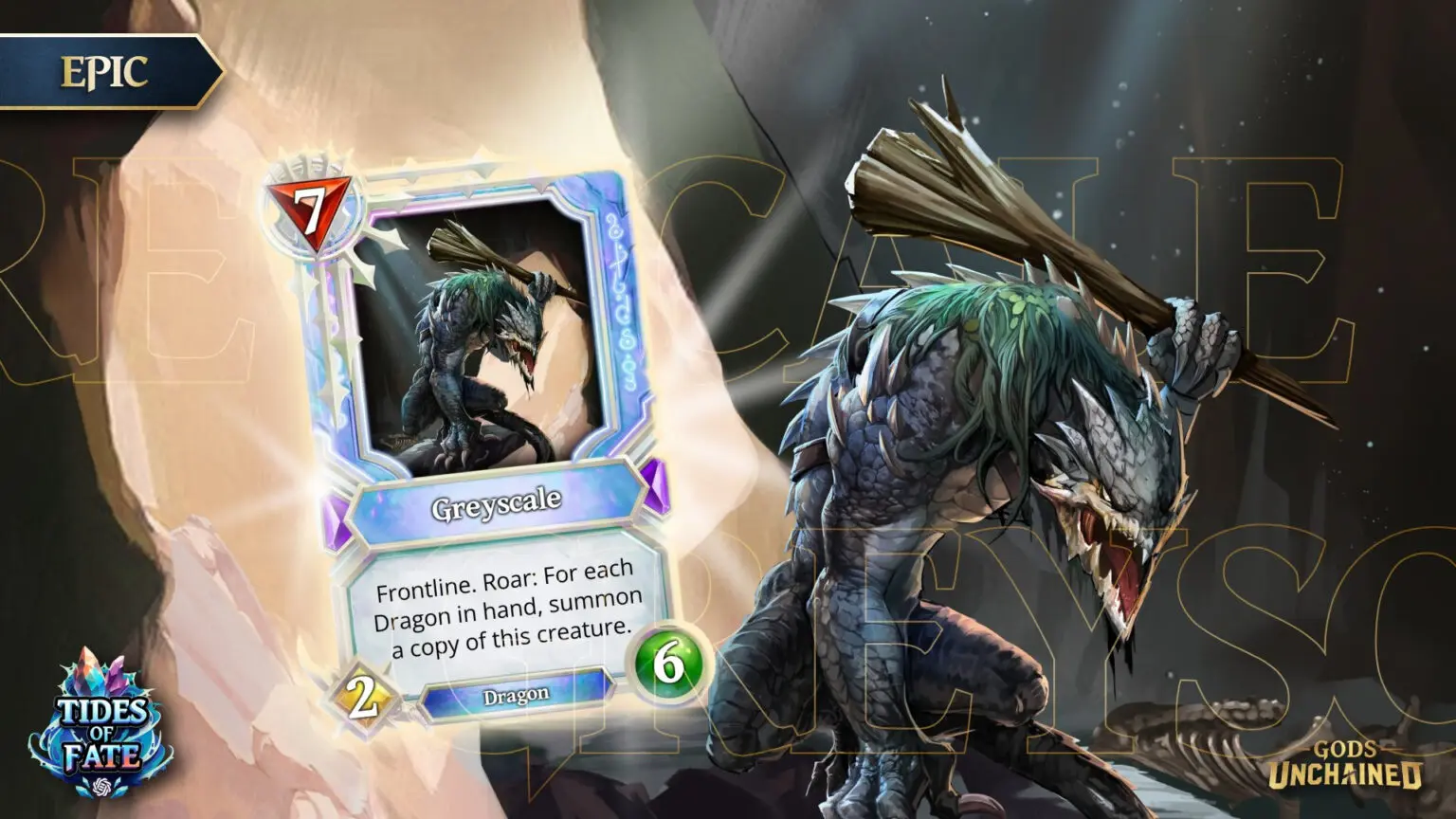
(3) Security and Privacy
In the realm of web3 gaming, numerous elements such as items, achievements, and cryptocurrency rewards are stored on-chain. By leveraging distributed ledgers, these games achieve enhanced account security through decentralization and cryptography. Storing player data on-chain reduces susceptibility to hacking, as there is no single point of failure in the system, bolstering overall resilience and security.
(4) Interoperability and Cross-Platform Play
The concept of using NFT-based skins, characters, and items across multiple games presents an innovative idea that is garnering interest from companies like Sony. While the realization of this concept may not be immediate, it represents an intriguing possibility for the future of gaming.
However, achieving gaming interoperability poses significant challenges. Developers would need to accommodate items transferred from various franchises, which could entail considerable developmental efforts. For instance, crafting hundreds of items in an Elder Scrolls game to resemble those earned in The Legend of Zelda would be a substantial undertaking.
Nevertheless, we may soon witness the emergence of video games that reward players with comparable gaming assets based on the contents of their crypto wallets. For instance, if a player earns a rare armor in The Legend of Zelda, they could potentially receive a similar rare armor in Elder Scrolls upon connecting their crypto wallet, offering a glimpse into the potential future of gaming integration.
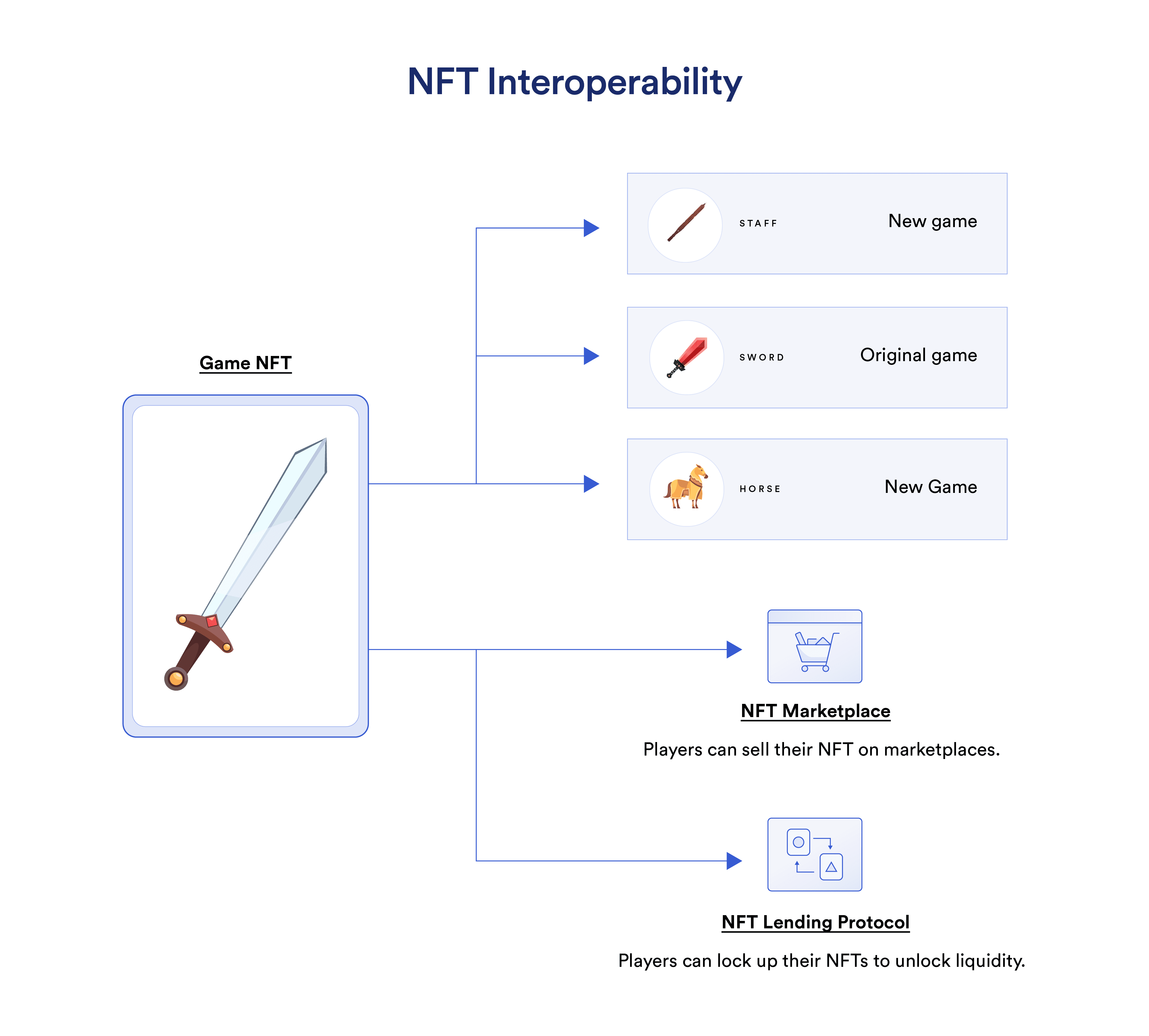
Web3 Gaming Use Cases?
(1) Play-to-Earn Games
These games offer players the opportunity to earn profits while playing. Frequently, players receive NFTs as rewards for completing missions or achieving high rankings on daily, weekly, or monthly leaderboards. These NFTs can be utilized within the game or traded with others on the secondary market. Additionally, some play-to-earn games reward players with cryptocurrency tokens as they progress.
Example: Gods Unchained
For example, Gods Unchained is a popular play-to-earn (p2e )and NFT trading card game (TCG) by Immutable (IMX) on the Ethereum blockchain. Here, cards of varying rarities can be openly bought, sold, and traded as NFTs. Players not only build their preferred decks but also earn $GODS tokens by playing and winning games. These tokens can be used to purchase new card packs or contribute to the in-game governance mechanism.
Gods Unchained closely mirrors the gameplay of popular online card games like Hearthstone and Legends of Runeterra. In this player-versus-player (PvP) format, participants strategically employ decks of cards to outwit opponents and secure victory.

To expand their card collection, players acquire randomized packs of NFT cards using the game's native currency, $GODS tokens. This currency can be obtained through direct purchases from a marketplace or earned by actively engaging in gameplay. The uniqueness of these NFT cards lies in the fact that once acquired, players have full ownership, and a dedicated marketplace facilitates the seamless buying and selling of these digital trading cards.
Gods Unchained is a prime example of a p2e game that integrates blockchain technology to elevate a familiar gaming model. In contrast to games like Hearthstone or Legends of Runeterra, where players lack complete ownership of their cards, Gods Unchained harnesses the power of NFTs to emulate the advantages seen in physical card games like Yu-Gi-Oh! and Magic the Gathering. This includes the freedom to trade, purchase, and sell cards, all within the digital realm.

(2) Metaverse and Virtual Worlds
Indeed, virtual land plots can be represented as NFTs, enabling players to buy and sell them on the secondary market. Numerous web3 metaverse projects facilitate the purchase of items within their gaming worlds using cryptocurrency, providing players with a seamless and decentralized marketplace for virtual assets and experiences.
Example: The Sandbox
The Sandbox, a decentralized virtual world boasting over 27,000 landowners in its alpha phase, now hosts nearly 700 live player-created games with 50,000-100,000 monthly active users. Fueled by the $SAND token, Sandbox features a user-friendly Game Maker, empowering creators in game design, asset creation, and world-building.
Recent partnerships with over 400 top brands, including FaZe Clan, The Walking Dead, Snoop Dogg, and Ubisoft, have broadened the platform's appeal. The metaverse now boasts over 20 branded avatar collections, allowing players to express themselves through digital identities.
The Sandbox is a metaverse game with unique play-to-earn elements. Players can buy and sell land to be used for games and virtual experiences. You can also design gaming assets in the Sandbox's VoxEdit software, which can be sold in the Sandbox marketplace and used to build scenes or games.
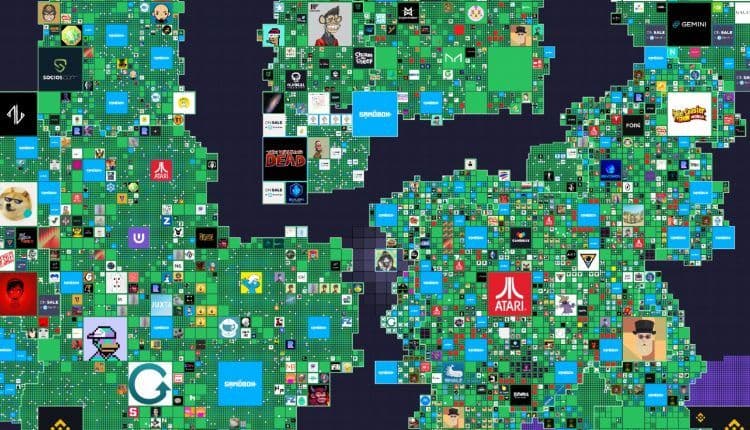
(3) Gaming DAOs
DAOs (Decentralized Autonomous Organizations) significantly influence web3 gaming in diverse ways. Firstly, investment DAOs collaborate to collectively invest in web3 gaming projects, pooling resources and expertise to support innovation and growth in the sector.
Vdeo game publishing companies structured as DAOs enable employees to participate in important business decisions through voting mechanisms, fostering a more democratic and inclusive workplace while also sharing company profits.
Additionally, web3 gaming projects like Decentraland utilize governance tokens to empower players to actively participate in shaping the game's growth and development. Through these tokens, players can engage in decision-making processes, contributing to the evolution of the gaming experience in a decentralized manner.

The Future of Web3 Gaming?
In conclusion, the emergence of web3 represents a tantalizing glimpse into the future of gaming, promising a decentralized and transparent environment where players have greater control and ownership over their virtual experiences.
The potential benefits of web3, such as true digital scarcity, secure transactions, and player-driven economies, hold significant promise for reshaping the gaming landscape. However, it's essential to acknowledge the challenges that lie ahead, including scalability issues, regulatory concerns, and the need for widespread adoption.
Nevertheless, with continued innovation and collaboration within the gaming and blockchain communities, web3 has the potential to revolutionize the industry, ushering in a new era of gaming that empowers players and developers alike. As we navigate the evolving landscape of technology and gaming, the question of whether web3 is the future of gaming remains open, awaiting further exploration and development.
This article was inspired by an original blog post from Hedera you can read the full post on their website here for more information.

